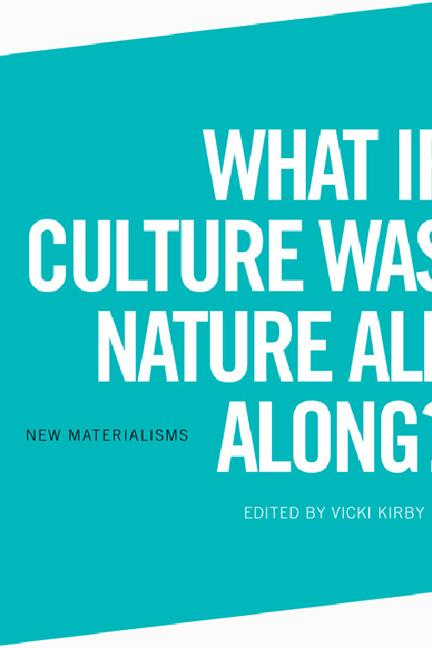Book contents
- Frontmatter
- Contents
- Acknowledgements
- Foreword
- 1 Matter out of Place: ‘New Materialism’ in Review
- 2 Method Matters: The Ethics of Exclusion
- 3 Sensory Substitution: The Plasticity of the Eye/I
- 4 Allergy as the Puzzle of Causality
- 5 Pregnant Men: Paternal Postnatal Depression and a Culture of Hormones
- 6 Material Culture: Epigenetics and the Molecularisation of the Social
- 7 Racialised Visual Encounters
- 8 Microbiology as Sociology: The Strange Sociality of Slime
- 9 Nature Represents Itself: Bibliophilia in a Changing Climate
- 10 Climate Change, Socially Synchronised: Are We Really Running out of Time?
- 11 A Sociality of Death: Towards a New Materialist Politics and Ethics of Life Itself
- Notes on Contributors
- Index
4 - Allergy as the Puzzle of Causality
Published online by Cambridge University Press: 22 December 2017
- Frontmatter
- Contents
- Acknowledgements
- Foreword
- 1 Matter out of Place: ‘New Materialism’ in Review
- 2 Method Matters: The Ethics of Exclusion
- 3 Sensory Substitution: The Plasticity of the Eye/I
- 4 Allergy as the Puzzle of Causality
- 5 Pregnant Men: Paternal Postnatal Depression and a Culture of Hormones
- 6 Material Culture: Epigenetics and the Molecularisation of the Social
- 7 Racialised Visual Encounters
- 8 Microbiology as Sociology: The Strange Sociality of Slime
- 9 Nature Represents Itself: Bibliophilia in a Changing Climate
- 10 Climate Change, Socially Synchronised: Are We Really Running out of Time?
- 11 A Sociality of Death: Towards a New Materialist Politics and Ethics of Life Itself
- Notes on Contributors
- Index
Summary
In contemporary immunology and biomedicine it is generally stated that our understanding of allergy is limited because we have not yet definitively determined its causes. Like many other conditions, the identity of allergic disease is tied to the elucidation of a clear aetiology – the identification of faulty mechanisms or processes in the organism, or to the isolation of foreign, pathogenic entities. To date, attempts to conclusively determine the causes of this condition have come up short. Within immunology allergy refers to a class of disease bearing a strong genetic or biological basis, and caused by exposure to external, environmental substances (Janeway et al. 2005: 523). However the empirical data that supports this perspective is plagued with inconsistencies that cannot be explained by current knowledge and practice in immunology (Jarvis and Burney 1998: 607; Sublett 2005: 445). In the fields of psychology and psychosomatic medicine allergies are viewed as psychogenic, with various allergic conditions being diagnosed and treated using tools such as psychotherapy and hypnosis (Miller and Baruch 1956). Yet many practitioners and researchers in these areas acknowledge the existence of a biological, constitutional component that underlies the operation of psychological triggers and participates in allergic reactions (Dunbar 1938). Psychosomatic studies commonly report that allergic symptoms can be successfully alleviated with the use of psychotherapeutic tools, but that such tools cannot eliminate the biological predisposition itself (Hansen 1927; Diehl and Heinichen 1931). Here, the fact that allergic symptoms can be treated without altering the underlying predisposition complicates the identity and role of biology in allergic events.
The evidence from these disparate fields shows that the causes of allergy are both biological and psychological. This suggests that the aetiology of allergy cannot be resolved by deferring to an explanation that privileges one or another of its causes. Studies that recognise this dilemma, typically within psychology, psychosomatic medicine and psychoneuroimmunology, argue that a more comprehensive understanding of allergic disease is needed – one that accounts for the findings of psychological and biological investigations together (Banks Gregerson 2000). This perspective is exemplified in the turn toward multifactorial and biopsychosocial models of illness, which attribute the pathogenesis of allergy to a confluence of biological, psychological, social and other factors (Wilce 2003).
- Type
- Chapter
- Information
- What if Culture was Nature all Along? , pp. 70 - 89Publisher: Edinburgh University PressPrint publication year: 2017



